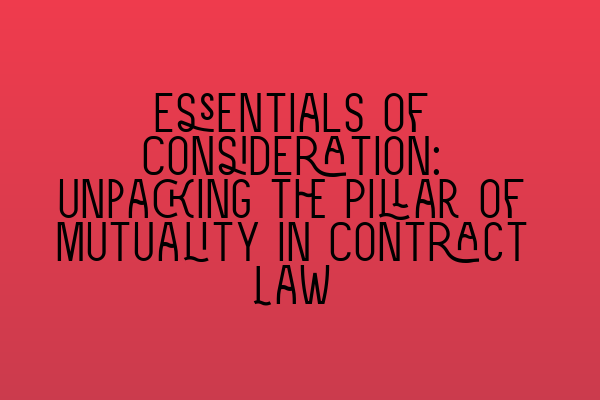Essentials of Consideration: Unpacking the Pillar of Mutuality in Contract Law
In contract law, one of the fundamental elements that must be present for a contract to be legally binding is consideration. Consideration refers to something of value that is exchanged between the parties involved in a contract. It is a key concept that ensures the fairness and enforceability of contractual agreements.
Consideration is often referred to as the “pillar of mutuality” because it requires a mutual exchange of promises or actions between the parties. Without consideration, a contract is considered to be a mere promise and not enforceable in a court of law. In this blog post, we will unpack the essentials of consideration and its significance in contract law.
The Requirement of Consideration
Consideration serves as a vital requirement for the formation of a valid contract. Both parties involved must provide something of value, whether it is money, goods, services, or forbearance, in exchange for the promise or performance of the other party. This principle ensures that both parties have a shared obligation and that there is a bargained-for exchange.
For example, let’s say John promises to sell his car to Sarah for $10,000. In this case, John’s promise to sell the car is the consideration, and Sarah’s promise to pay $10,000 is the consideration provided by her. If either party fails to fulfill their promise, the contract can be legally enforced by the other party.
Types of Consideration
Consideration can come in various forms, and it is not limited to monetary value. Here are the different types of consideration:
- Money: Payment of a specific sum of money in exchange for goods, services, or performance.
- Goods: Transfer of ownership or possession of tangible items.
- Services: Performance of an act or provision of a service.
- Forbearance: Refraining from doing something that one has a legal right to do.
It is important to note that consideration must be sufficient but not necessarily adequate. This means that the court will not assess the adequacy of the consideration but only ensure that there is something of value exchanged between the parties.
Past Consideration and Exceptions
Generally, past consideration is not considered valid in contract law. Past consideration refers to something that has already been performed or given by one party before the formation of the contract. However, there are exceptions to this rule.
One such exception is when there is an express promise to pay for the past consideration. For example, if Sarah completes a project for John without a prior agreement for payment, but John later promises to pay her for her services, the promise of payment becomes the consideration for the past act.
Conclusion
Consideration is a fundamental concept in contract law that validates the enforceability of a contract. It ensures that both parties have a mutual exchange of promises or actions, creating a legal obligation. Understanding the essentials of consideration is crucial for solicitors and legal professionals to draft and review contracts effectively.
If you are preparing for the SQE exams and looking for resources to enhance your contract law knowledge, check out our related articles:
- SQE 1 Practice Exam Questions
- SQE 1 Practice Mocks FLK1 FLK2
- SQE 2 Preparation Courses
- SQE 1 Preparation Courses
- SRA SQE Exam Dates
By familiarizing yourself with these resources, you can enhance your understanding of contract law and improve your chances of success in the SQE exams. Good luck with your studies!
